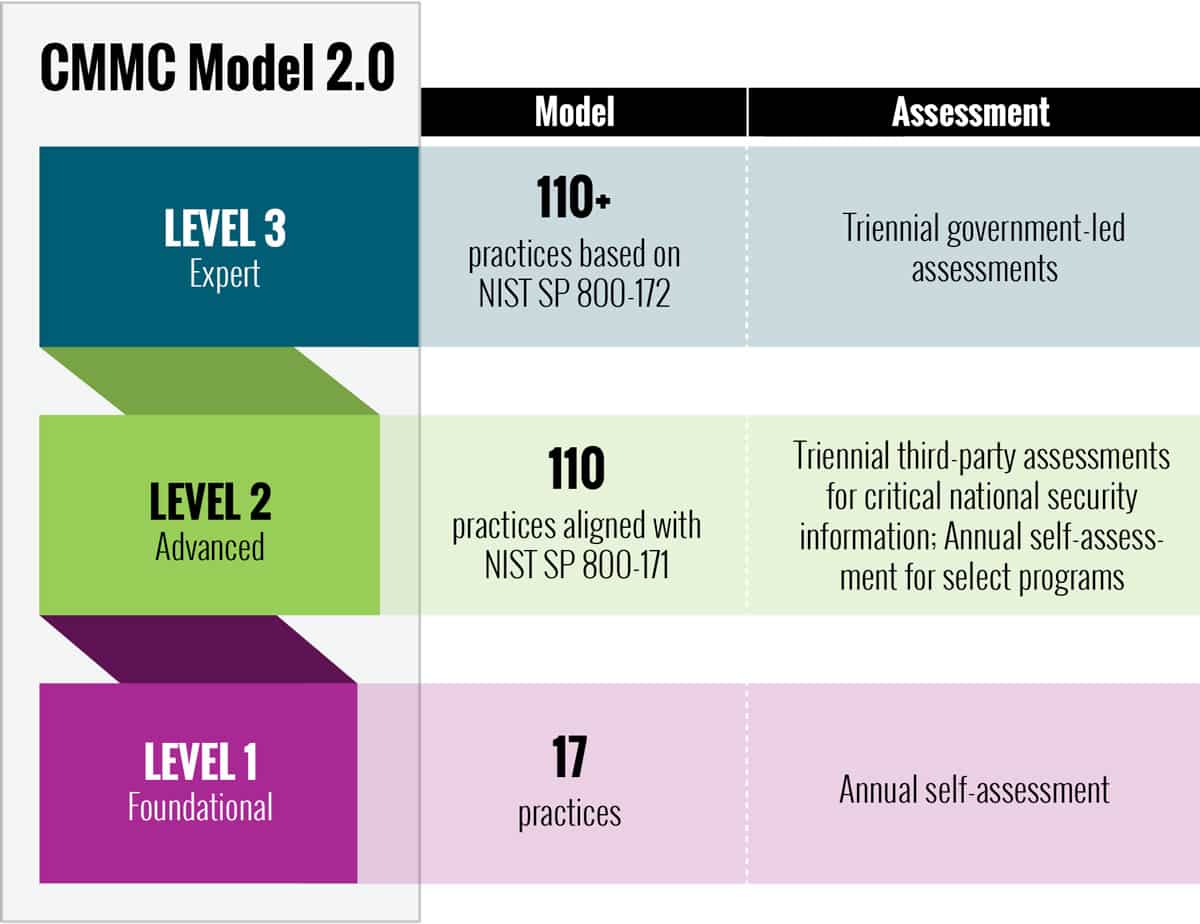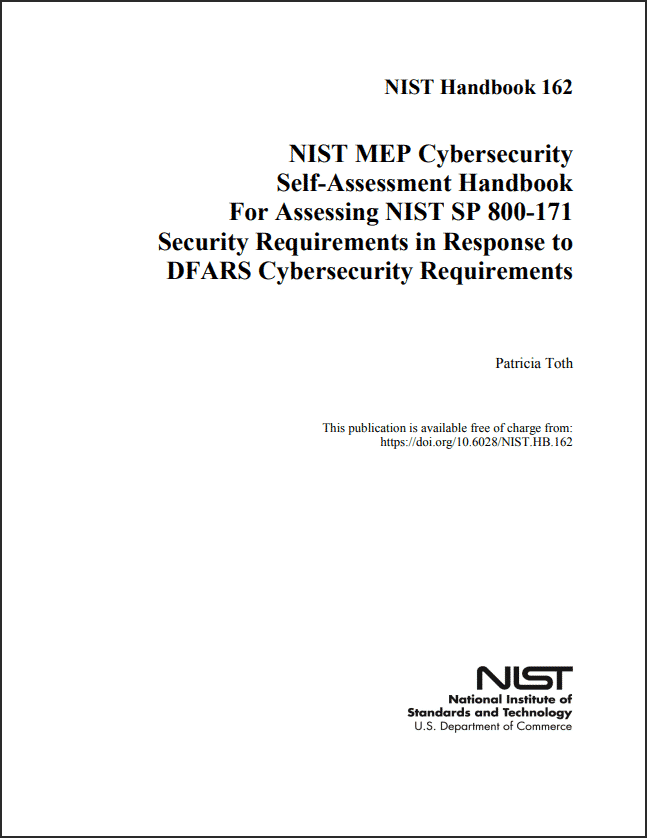Why The DoD Created The CMMC
Department of Defense (DoD) contractors are now well aware of the cybersecurity mandates that have been sweeping across the defense industry over the past several years. In 2015, The U.S. Department of Defense published the Defense Acquisition Federal Regulation Supplement, known as DFARS, which mandates that private DoD Contractors adopt cybersecurity standards according to the NIST SP 800-171 cybersecurity framework. This is all part of a government-led effort to protect the U.S. defense supply chain from foreign and domestic cyber threats, and reduce the overall security risk of the sector.
Since the passing of DFARS, over 300,000 U.S. DoD contractors have been scrambling to understand DFARS and implement NIST SP 800-171 standards within their companies to become compliant with the regulation. Some have had the internal resources to become compliant themselves, while others have outsourced the task to a CMMC Registered Provider Organization (CMMC RPO), such as SysArc, who help DoD contractors comply with the cybersecurity compliance mandate. Even though the DoD has incentivized compliance by making it a “competitive advantage” within the contract awards process, many contractors have chosen to put off compliance. There are even reported cases in which DoD contractors have stated false claims, stating to be in compliance on DoD contracts, but have later been found to be non-compliant. Because of the slow adoption rate of the DFARS 252.204-7012 regulation, the Department of Defense created the Cybersecurity Maturity Model Certification (CMMC) to ensure appropriate levels of cybersecurity controls and processes are adequate and in place to protect controlled unclassified information (CUI) on DoD contractor systems.
Version 1.0 of CMMC was released in late January 2020, and since then many updates have been made. This guide was written for DoD contractors specifically and provides information about what we know about the CMMC, what contractors can expect as the DoD rolls out this program, and the options they have to prepare for a CMMC audit so they can become certified and continue to offer their products and services to the DoD without delay.
Note: This guide has been updated to Version 2.0 of the CMMC model and will be updated as more information is released by the Department of Defense. Because CMMC rollout is a rapidly changing topic, we also have a CMMC News page which features our executive summaries of the latest updates to the Cybersecurity Maturity Model Certification (CMMC) from the Accreditation Body, CMMC-AB. We also have a guide which details the changes from CMMC 1.0 to 2.0
The CMMC Model
Watch: Tim Brennan, CEO of SysArc, walks you through the latest updates to CMMC and what DoD contractors can expect moving through 2022 and 2023.
About CMMC Levels
- Level 1 Foundational: Requires implementation of 17 cybersecurity controls. These controls can be found in Federal Acquisition Regulation (FAR) 52.204.21. Annual self-assessments and affirmation of compliance are required.
- Level 2 Advanced: Requires implementation of 110 cybersecurity controls from NIST SP 800-171. Third-party assessments from C3PAOs will be required for most contracts every three years, with select contracts only required to perform self-assessments annually.
- Level 3 Expert: Details are still being worked out, but it is expected that this level will require controls from NIST SP 800-172. This level is designated for highly-sensitive DoD programs.

Self-Assessments vs. Third-Party Assessments
The DoD will verify contractors’ compliance in 3 ways:
- Annual Self-Assessment: Required for CMMC Level 1 and only select programs within Level 2.
- Triennial 3rd-Party Assessment by C3PAO: Required for CMMC Level 2.
- Government-Led Assessments: Required for Level 3
Each contract will specify which Level of CMMC contractors must meet before they can be awarded the contract.
How to Prepare for CMMC
As mentioned above, the various CMMC levels call for different controls outlined in FAR 52.204.21, NIST SP 800-171, and NIST SP 800-172. DoD Contractors should determine which CMMC level they wish to obtain and then implement the controls necessary. For DoD contractors that have already implemented all NIST SP 800-171 controls, they should have no issues with passing a CMMC assessment successfully up to CMMC Level 2.
For DoD contractors who have not implemented the any controls, the following options are available to prepare for a CMMC assessment:
Do it Yourself: Meet Requirements In-House
DoD contractors or suppliers who have the resources and IT staff available can meet the appropriate CMMC level of cybersecurity in-house. Internal IT departments can use the “Self Assessment Handbook – NIST Handbook 162” provided by the National Institute of Standards and Technology (NIST). This handbook was created by NIST with the intention of assisting U.S. DoD contractors who provide products and services for the Department of Defense. Unfortunately, this handbook only covers NIST SP 800-171 Rev. 1 and there is currently not a Self Assessment Handbook for NIST SP 800-171 Rev. 2.
NIST has also made available a System Security Plan (SSP) template, and a template — two required documents for compliance.
If the contractor does not have the expertise to meet the requirements of NIST SP 800-171, DoD contractors have the option of outsourcing the requirements to a third-party CMMC consultant, like SysArc, who offers CMMC compliance services. There are many qualified and experienced Managed Security Service Providers (MSSP) in the U.S. who specialize in compliance services and monitored cyber security for DoD contractors who need to implement NIST cybersecurity controls. A qualified MSSP will be able to perform this assessment and perform any remediation work necessary to pass a CMMC Audit. Look for MSSPs who have obtained CMMC RPO status. An updated list of verified RPOs by the CMMC Accreditation Body can be found here.
Outsource: Work with a CMMC Consultant
For many DoD contractors, the most effective way to meet the CMMC cybersecurity requirements is to outsource the task to a CMMC RPO that specializes in CMMC Consulting. Remember that DoD contractors remain ultimately responsible for ensuring that their company meets the appropriate cybersecurity requirements, so it is essential to choose an RPO that they can trust.
By outsourcing the NIST cybersecurity work to a qualified provider, DoD contractors should save a lot of time and money getting and staying compliant with CMMC. An outsourced provider will have all of the required knowledge and experience for the Readiness Assessment, System Security Plan (SSP), and Plan-of-Action & Milestones (POA&M), as well as the advanced tools required to monitor and respond to security incidents. They will also have the resources required to perform the remediation steps required to become compliant and the legal documentation to prove compliance has been reached and is being maintained when the time comes for a CMMC Audit.
The CMMC Readiness Assessment
The first step towards certification is for the DoD contractor to get a third-party Readiness Assessment completed to see how close, or how far away, the DoD contractor is from meeting the minimum requirements outlined in the appropriate CMMC Level. The Readiness Assessment is designed to discover inadequate system setups and processes that may not meet all of the required controls. Taking a close look at a company’s network and procedures is the first step to ensuring compliance.
The results of the CMMC Readiness Assessment may reveal issues such as:
- How access to information systems is controlled
- How managers and information system administrators are trained
- How data records are stored
- How security controls and measures are implemented
- How incident response plans developed and implemented
Without a gap analysis, it’s impossible to know what changes an organization needs to make before it meets the required CMMC Level. The professionals at an MSSP use their findings to create remediation plans that will correct any problems and keep our clients in line with CMMC requirements.
The gap analysis will either aid a DoD contractor in performing their own remediation plan, or they may opt to have a third-party, such as an MSSP, perform the remediation for them.
The Remediation Plan
A CMMC Consultant should develop a remediation plan based on the findings outlined in the Readiness Assessment. A remediation plan may involve small, relatively inexpensive fixes to a network and/or its processes, or it may involve more extensive, from the ground up, development of compliant networks and processes that meet today’s cybersecurity standards.
Remediation plans provide detailed documentation of processes that don’t meet today’s standards. Having a well-researched plan also makes it easier for DoD Contractors to make necessary changes to their systems.
Ongoing Cyber Security Monitoring and Reporting
Once the remediation plan is complete and a DoD Contractor’s systems and procedures are compliant with the appropriate CMMC Level, an MSSP will have the tools and processes in place to monitor, detect, and report on cybersecurity breaches within the DoD Contractor’s systems. If the DoD Contractor is not outsourcing compliance to an MSSP, they have the option to report cyber incidents themselves, given they have tools to monitor and detect such incidents.
The Importance of Passing the First Third-Party Assessment
For many companies, DoD contracts make up a substantial percentage of their revenue, and because CMMC certification will now be a requirement for contract awards, it’s extremely important that contractors get prepared to pass the CMMC assessment as soon as possible. If you are not prepared to pass your desired CMMC Level you run the risk of being unable to offer products and services to the DoD for an extended period due to:
- The time it takes to implement all of the security controls required for the Program you desire to bid on if you have waited until the last minute
- The potential backlog of audits could affect the time it takes to get an audit done.
Therefore, it is highly recommended that a contractor consult with an experienced CMMC Consultant who can ensure that the contractor meets the requirements of their specified CMMC Level and can pass a CMMC Audit on the first try.
CMMC Rollout Timeline
The Department of Defense (DoD) has outlined its four (4) phase approach for the inclusion of Cybersecurity Maturity Model Certification (CMMC) Program requirements in solicitations and contracts. The first phase is expected to begin in the 1st quarter of 2025, after The Office of Information and Regulatory Affairs (OIRA) approval, and conclude with the fourth phase expected around September 2027.
Please note: These dates reflect our expectations based on the information provided by the DoD. Therefore, these dates may change. We will update our site as soon as new information becomes available.
Phase Timeline:
- Phase 1 (1st quarter of 2025): Begins on the effective date of the CMMC revision to DFARS 252.204–7021
- Phase 2: Begins six months following the start date of Phase 1
- Phase 3: Begins one calendar year following the start date of Phase 2.
- Phase 4: Full Implementation. Begins one calendar year following the start date of Phase 3.
For details on each phase, please see our full article here. Read our recommendations for DoD contractors here.
Frequently Asked Questions
Click on each question below to reveal the answer:
CMMC Audit Preparation & Assessment Services
SysArc has helped over 1000 DoD contractors throughout the U.S. navigate the complexities and financial hurdles of the NIST SP 800-171 requirements. We have worked closely with our customers to ensure they are compliant with DFARS 7012 and now we are working with them to achieve the CMMC certification level they need to continue providing their products and services to the DoD. For more information, please see our CMMC Preparation Solution. If you’d like to speak with someone about preparing for a CMMC audit now, feel free to give us a call at (240) 453-4146 or schedule a CMMC consultation now.
